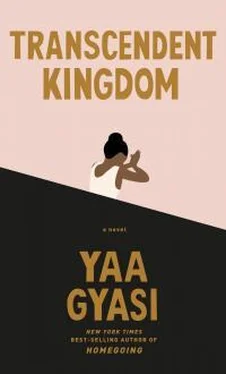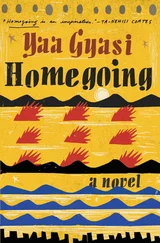I do remember that my mother didn’t come home on time. She was with the Foster family, new to her since Mrs. Palmer’s passing. She was back on day shift, so she usually got in by seven o’clock. Instead, that night, she shuffled in at eight, apologizing while unloading the car. Mr. Foster’s daughter was in town and the woman had talked her ear off.
I’d made myself dinner and I offered some to my mother. We both stared at the clock, and then the door, the clock and then the door. He didn’t come in. We had developed a routine, an unspoken rule. Nana got two days before we hopped in the car and searched for him. He got four days before we called the police, but it had only come to that once, and that night was day one. We weren’t there yet.
We didn’t know to worry, so when the police knocked on our door at about nine o’clock to tell us that Nana had overdosed on heroin and died in the parking lot of a Starbucks, we were blindsided. We’d thought our routine would save us, save him.
I didn’t write anything in my journal that night or for many years thereafter.
38
I ran into Katherine at the sandwich shop about a week after I’d bumbled through our lunch. I saw her bent over before a wire rack of chips, trying to pick out which ones she wanted, and I turned on my heels to escape.
“Gifty!” she shouted. I’d almost made it to the door. She jogged over toward me, a bag of sour cream and onion in hand. “How are you doing?” she asked.
“Oh hi, Katherine. I’m doing great, thanks,” I said.
“Why don’t you join me for lunch?”
“I’ve got a lot of work to do.”
“It’ll still be there after you eat,” she said, reaching for my hand. “I insist.”
She paid for the chips and my sandwich as well, and we headed over to the high-tops at the far end of the shop. It was almost empty save a few undergrads who had made their way over to this graduate student part of campus, probably for the quiet, the decreased chance of recognition. I’d once been like that, so lonely that I craved further loneliness. Even after I’d made a few friends in college, I would still go out of my way to create whatever conditions I needed that might allow me to be alone. If I’d done it right that day, I wouldn’t be stuck eating with Katherine.
“Are you still having trouble writing?” Katherine asked.
“It’s been a lot better,” I said. I picked at my sandwich while Katherine popped open her bag of chips and started eating them slowly, one chip at a time.
We sat there quietly for some time. I wanted to escape the intensity of Katherine’s gaze, and so I stared down at my food as though the key to life was stuffed between sourdough slices. Finally, Katherine broke the silence.
“You know, Steve is from the East Coast and he really wants to move back after I finish here, but why would anyone want to live anywhere that isn’t California? I spent a summer in LA and now even the Bay Area is too cold for me. Seasons are overrated.”
“Did you decide about the baby thing?”
She looked surprised. Clearly she didn’t remember telling me about Steve’s surreptitious ovulation calendar. “We haven’t figured that out yet. He wants to start trying, but I want to wait until after my postdoc at least. I’m thirty-six, so it might be an uphill battle maybe, but that’s true of my work too. I just don’t know. What about you? Do you ever think about having kids?”
I shook my head quickly, too quickly. “I don’t think I’d be a very good mother,” I said. “Besides, I haven’t had sex in like a year.” Suddenly, I felt embarrassed by my revelation, but Katherine didn’t seem even the least bit fazed. I felt like I’d shrugged the shoulder of my dress off, revealing skin. I’d lost some of my timidity around the subject of sex, but not all of it. For years I hadn’t been able to reconcile wanting to feel good with wanting to be good, two things that often seemed at odds during sex, especially sex the way I liked it. Every time, afterward, I would lie there staring at the ceiling, picturing my promises like little balloons floating up and away, ready to be popped.
I met Justin, the guy I officially lost my virginity to, at a mixer in New York called POC x Ivy League the summer after I’d graduated college. The first time we had sex, my body had been so rigid, my vagina so tense, that he looked at me uncertainly and said, “I don’t think I can do this. Like literally, I don’t think I can get it in.”
“What should we do?” I asked, mortified but determined. I was taking the train back to Boston in a few hours, and I wanted this, wanted him. He left the room and came back with a jar of coconut oil, and after some massaging and encouraging, he was inside me. It hurt then, but by the end of that summer, we had found a delicious rhythm, visiting each other every few weekends just to spend a night or two together. I started to want more, more scratching, more talking.
“Are you a bad girl?” Justin would ask in bed. I was heading to California soon for graduate school, and we both knew, had always known, that the end was near. “Are you a bad, bad girl?”
“Yes,” I said through gritted teeth, enjoying the pleasure he gave me, but in my head, I thought, No, no, no. Why can’t I be good?
Katherine finished eating her chips and wiped her hands on a napkin. “You’re still in your twenties, right?” she said. “Jesus, you’re so young, and so damn brilliant. I honestly can’t wait to see what you do in like five years, and if kids aren’t a part of that equation, who cares? Your work is going to be big. I can feel it. What got you into this field anyway?”
The question threw me off guard, which was probably what she’d intended. I looked at Katherine. Powder from the chips had collected on her lips, giving them a pale white shimmer.
“My mom’s depressed. She’s staying with me at the moment. In my bed. She’s suffered from depression in the past and had a bad experience with psychiatric care, so she’s really resistant to getting help. So, yeah, she’s been here with me for about two weeks now.” The words rushed out of me and I was so happy, so relieved, once they were said.
Katherine stretched out her hand, placed it over my own. “I’m so sorry. This must be really hard for you,” she said. “How can I help?”
Gye Nyame, I wanted to say. Only God can help me.
—
My mother took a week off of work after Nana died. She wanted to throw a big, Ghanaian-style funeral complete with food and music and dancing. She sent money and measurements to the Chin Chin Man so that he could have our mourning clothes made. When they arrived, I took mine out of the package and held it. It was bloodred and waxy to the touch, and I didn’t want to wear it. I couldn’t remember the last time I had been required to wear traditional dress, and I thought it would seem like a lie. I felt about as Ghanaian as apple pie, but how could I tell that to my mother?
What weeping, what gnashing of teeth. My mother was nearly unrecognizable to me. When the policemen left our house the night of Nana’s overdose, she fell to the ground, rocking, clawing at her arms and legs until she drew blood, crying out the Lord’s name, “Awurade, Awurade, Awurade.” She had not stopped crying since. How could I tell her that I found my mourning clothes garish? That I didn’t want the attention this funeral would draw? I didn’t want any attention at all, and in those first few weeks I was safe from it. Nothing teaches you the true nature of your friendships like a sudden death, worse still, a death that’s shrouded in shame. No one knew how to talk to us, and so they didn’t even try. I should never have been left alone with my mother in those days after Nana died, and my mother should never have been left alone with herself. Where was our church? Where were the few Ghanaians, scattered through Alabama, whom my mother had built friendships with? Where was my father? My mother, a woman who hardly ever cried, cried so much that first week she fainted from dehydration. I stood over her body, fanning her with the closest thing I could find—her Bible. When she came to and figured out what had happened, she apologized. She promised me that she wouldn’t cry anymore, a promise she wasn’t yet capable of keeping.
Читать дальше












